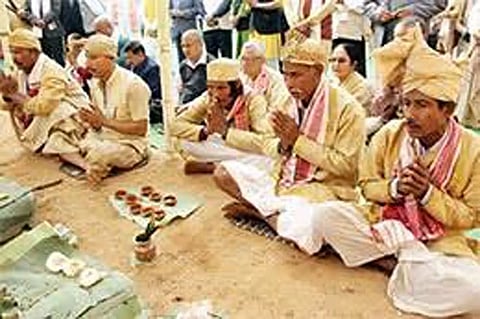
- Home
- Live Blog
- Breaking News
- Top Headlines
- Cities
- NE News
- Sentinel Media
- Sports
- Education
- Jobs

Dr. B. K. Gohain
(The writer can be reached at dr.gohain@gmail.com)
The Ahoms have the system of worship of their ancestors like other Tai people of the world. Even the Buddhist Tais pay oblations to their ancestors. The concept of the worship of the ancestors is very vibrant in the case of the Tai Ahoms. In fact, the ancestor-worship is the solid foundation of the traditional Tai Ahom religion.
The worship of the ancestors is called Me Dam Me Phi in Tai, 'me' meaning worship, 'dam' meaning the spirits of the dead in the family and 'phi' meaning god. Me Dam Me Phi (pronounced as 'may daam may phi') means that the spirits of the dead are worshipped as gods by their descendents.
According to the traditional Tai Ahom religion, the ancestors of the family protect the members of the family against all odds. There is no need for worshipping the gods and goddesses of the Heaven and the earth as dam phi, that is, spirits of the ancestors, when propitiated, protect the members of the family in all ways. So the sayings go;
Neither the walls nor the roof protect nor the gods and goddesses can protect if the family is not protected by the spirits of the dead (dam phi).
In the families of the Priestly clans of the Tai Ahoms, on the Bihu and other occasions, each household celebrates the me dam me phi (ancestors' worship) offering oblations to the immediate ancestors like parents, grandparents, great grandparents and the spirits of the children, unmarried members of the household. While the first set of the spirits of the dead, generally of the parents is called the new spirits (na dam), the next higher spirits, generally of the grandparents is called the principal spirits (ghai dam) and the next higher ranked spirits are called the ancient spirits (Chiren dam), generally the spirits of the great grandparents. Another category of the spirits is called the collective spirits (Jakorua dam), that is, the spirits of the children and unmarried persons of the household. All these categories of the spirits dwell in the main post (pho'kam) of the main house, which is the kitchen which is the most sacred room in the house. The next higher ranked ancestors are called Kha Dai Chiren dam (generally the spirits of the parents of the great grandparents) which reside at the foot of the stairs. As the Ahoms have discontinued living in the raised houses with stairs, this category of ancestors is supposed to dwell outside the main gate of the house.
In the household worship of the ancestors, the place for worship is the kitchen near the main post where the spirits of the immediate seniors, that is, those of the parents, grandparents and great grandparents are believed to reside. Also the spirits of the children and unmarried persons of the household reside in the post called pho'kam.
Raised bamboo platforms, one each for the new spirits, another for the principal spirits, another for the ancient spirits and another for the collective spirits are constructed in the kitchen on the occasion of me dam me phi in the household. Plantain leaves, one each, are spread over the raised bamboo platforms over which food like cakes and homemade liquor in banana sheath containers as well as cut pieces of the betel nut and betel leaves with the sacred blokchingpha flower inside are placed. The head of the house performs the task of worship by chanting incantations in Tai. The offerings are purified by the sprinkling of water stirred with a bunch of blokchingpha flower. The members of the family and the invitees are treated to the portions of offered food and drinks and pieces of betel nut wrapped up with betel leaf.
Historically speaking, it was the great king Chaolung Siukapha who initiated the celebration of the collective ancestors' worship in Assam. The main difference from the household ritual is that in the collective me dam me phi ritual, the Lord of Heaven namely Lengdon, other gods and goddesses (Jachingpha) as well as two evil spirits are propitiated in addition to the ancestors worshipped collectively as Chao Dam Phi. The gods of Heaven are Khaokham (Lord of waters), Ai-Lengdin (Lord of the earth), Janchaihung (Guru of the gods), Pha Nuru Lengdon (Lord of Heaven), Chitlamcham (seven sons of the Lord of heaven), Mutkum Taikum (the sun and the moon gods) and Jachingpha (Goddess of learning). Chao Dam Phi (ancestors) is worshipped collectively for all. At the farthest end, two plantain leaves, one for the evil spirit Rakhin and the other for the evil spirit Bakhin are spread on the ground. Except for Khaokham and Ai Lengdin who are worshipped on the ground with plantain leaves spread on the ground over which the eatables, drinks and betel nuts wrapped up with betel leaves are offered, other heavenly deities are worshipped over the raised bamboo platforms with the offerings of eatables and liquor and cut pieces of betel nut wrapped up with the cut pieces of betel leaves with a blokchingpha flower in between. The collective ancestors (Chao Dam Phi) are worshipped over the raised platform with the same kind of offerings. When the ritual is performed in the phuralong way without blood sacrifice, eggs are offered in addition to the compulsory items of food and drinks. But when it is celebrated in the normal way (Banphi) chickens are offered to each and every one. Altogether 23 chickens are offered. The priests offer the chickens, each one of them having been killed by hitting on the head with a stick of the guava tree.
After the ritual is over, people are entertained with a feast.